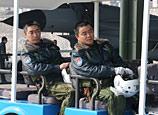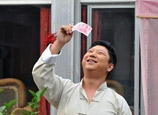
Volunteers are required to read aloud all information -- cover, illustration, index, name of the publishing house and page.
"Whatever information a normal person can see, we need to read it aloud," said Ms. Zheng Xiaojie, founder of Hongdandan Educational and Cultural Exchange Center, the library's parent agency.
She said the library did not have the right to "decide what blind people need," but provide all it had for them to choose from.
"Empowering them with the right to choose is giving them the true dignity. In so doing, they have equal rights and can share in cultural products," Zheng said, alluding to her initiative in creating the Xinmu Library
Mr. Xiao said he used to listen to radio programs on stories before Xinmu Library opened. "It was too passive to listen to the radio," he said.
"Story programs like taking breaks at cliff hanging points; I'm too impatient for that. Also, programs from China National Radio and such are often too political -- no good for relaxation," he added.
Xiao graduated from a local school for the visually impaired some 20 years ago. "I did read many books written in Braille at that time."
Xiao's disability has limited his profession to a masseur, but he loves books. He takes pride in having a cognition level similar to that of a regular person.
Just like Xiao, all frequent visitors can easily recognise many of the readers' voices.
"Ms. Shi Mulan has read 'Decoding Shangganling' and 'Sorrow of the Yellow River.' She has a southern accent. But I can accept that. Unlike young readers, her voice is full of emotion and holds a touch of history. It's like an old man telling stories," Xiao said, commenting on one of his favourite readers.


















 This is the most real, most helpless and most motivate life expense of Beijing!
This is the most real, most helpless and most motivate life expense of Beijing!


![]()
